Dr. Joseph has expertise in the following fields:

Diabetes is the most commonly diagnosed disorder of the endocrine system. Type 1 diabetes occurs when the body’s immune system attacks the cells of the pancreas that produce insulin, resulting in the need for insulin injections to maintain proper blood sugar levels. Most Americans suffer from type 2 diabetes, which occurs when endocrine system is unable to produce, respond to, or otherwise utilize insulin properly, causing the body to have lower levels of energy. In rare cases, diabetes can result in chronic kidney failure without treatment.
Gestational diabetes develops in women during pregnancy as a result of hormonal imbalance in the endocrine system. Certain hormones that are on the rise during pregnancy, including cortisol, estrogen, and human placental lactogen, all interfere with the body’s ability to properly control your blood sugar. When the pancreas fails to adapt to these hormonal shifts, blood sugar levels rise, resulting in gestational diabetes.
For those who suffer from diabetes on a constant basis, a diabetes insulin pump can help you regain your freedom. Insulin pumps are computerized devices no larger than a small cell phone that can be easily worn on the belt or placed inside your pocket. This device works to control the endocrine system with a personalized program that can manage blood sugar 24 hours a day. Those who chose to utilize insulin pump therapy are required to check their blood sugar at least four times a day.
Metabolic syndrome, also known as insulin resistance, is actually a combination of health problems which all cause the human body to be at higher risk of diabetes, stroke, and heart disease far earlier in life. They include obesity, high blood pressure, heart disease, abnormal cholesterol levels, and polycystic ovary syndrome. Metabolic syndrome is a lifelong condition, though lifestyle changes in diet and exercise can help one control their risk factors and thus reduce their risk of heart disease.
Lipid disorders are a grouping of conditions that cause high concentrations of lipids, also known as fats, to occur in the blood stream. These conditions can be inherited, or simply caused by one’s lifestyle. They include primary elevated cholesterol, dyslipidemic syndrome, primary elevated triglycerides, primary low-HDL syndromes such as dyslipidemia or dyslipoproteinemia, hyperlipidemia aka high cholesterol, familial hypercholesterolemia, and familial hypertriglyceridemia. These disorders can cause problems for the endocrine system, including diabetes.
Obesity not only affects the endocrine system, it can also be caused by it. Leptin is the hormone in our bodies that often tells us we are full. However, this hormone is also produced by fat, and in higher levels this hormone can actually cause you to not feel full during and even after a large meal. Obesity also causes insulin signals to suffer from excess tissue and fat, causing metabolic syndrome and type 2 diabetes.
Thyroid disorders occur when the hormones produced by the thyroid gland are too great or too few in number. This can result in a small yet harmless enlarged gland that requires no treatment to life-threatening cancer. While thyroid problems can often be uncomfortable problems of endocrine hormonal issues, most can be easily managed with a swift diagnosis and proper treatment.
- HypothyroidismHypothyroidism can occur as a result of too few thyroid hormones being produced, which often results in a large drop in a patient’s energy levels. This drop is hormone production can be caused by a number of endocrine system problems, most commonly Hashimoto’s thyroiditis, an autoimmune disorder that causes the body to attack the thyroid tissue itself. In other cases, chemicals that you may have been exposed to can damage the thyroid, such as large amounts of iodide from cold medicine, the heart medication amiodarone, contrasts in x-rays, and even lithium.
- HyperthyroidismHyperthyroidism occurs as a result of over production of thyroid hormones, but these causes can be due to several different reasons. Grave’s disease is one such cause of an excess of the thyroid hormone, while others include toxic adenomas and subacute thyroiditis that cause the thyroid gland to secrete or leak hormones, respectively. In very rare cases, hyperthyroidism can develop as a result of pituitary gland problems or even cancerous growths that have formed inside the glands of the thyroid.
- Thyroid NodulesThyroid nodules are growths, which grow along the front of your neck within the thyroid. In most cases nodules are not cancerous and do not cause problems for a patient; however, if thyroid nodules grow too large they can cause a patient to have trouble swallowing and breathing. The exact cause of thyroid nodules is unknown, though they are more common in older patients and those who have been exposed to radiation.
- Thyroid CancerThyroid cancer occurs when abnormal cells grow from inside the thyroid gland. This form of cancer is uncommon, but is also easily treated due to its obvious symptoms and early detection. Symptoms of thyroid cancer include a lump in the neck where the thyroid gland is located, trouble swallowing, a frequent cough, and a constant wheezing. A simply biopsy can diagnose thyroid cancer to begin immediate care as needed.
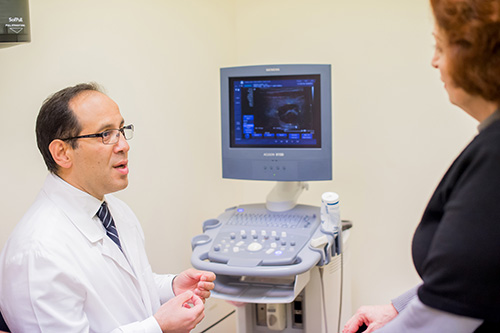
Bone and calcium metabolism disorders can be caused by a whole host of factors, including many of the hormones released by the endocrine systems. The material which makes up your bone is in fact an active tissue, and as such, hormones which are an integral part of the balanced bone formation and bone dissolving over time can cause this process to become unbalanced over time. Sex hormones allow bones to maintain calcium, while the parathyroid hormone regulates levels of calcium in the blood that work to build bone when needed.
- Osteoporosis and osteopeniaOsteopenia is the early sign of bone loss, which in most cases is followed by the development of osteoporosis. Osteopenia happens with the bone density is lower than normal, due to certain hormones produced by the endocrine system causing calcium to be improperly maintained or regulated. Osteoporosis occurs when the bone density becomes weaker over time, and is often diagnosed by the first fracture.
- Vitamin D deficiencyVitamin D deficiency occurs when levels of blood are greatly lacking in this crucial vitamin, which is a vital aspect in healthy bone and muscle production. Lack of Vitamin D in the body has been linked to cognitive impairment in the elderly, severe asthma in children, increased risk of death from cardiovascular disease, as well as certain types of cancer. There are many causes to Vitamin D deficiency, including the kidneys being unable to properly convert Vitamin D into its active form, thus halting its assistance with the rest of the body.
- HypercalcemiaHypercalcemia is a condition that occurs when calcium levels in the blood are higher than normal. While calcium is a necessary component in bone growth, heightened levels can actually interfere with this complex process. The most common cause of hypercalcemia can be found in the endocrine system, caused by an overactive parathyroid gland creating too much of the hormones that otherwise work to regular calcium levels, thusly creating the imbalance.
- HyperparathyroidismHyperparathyroidism is an endocrine disorder that occurs when one or more of the parathyroid glands becomes enlarged and secretes too much PTH or parathyroid hormone. The parathyroid hormone is necessary for the correct balance of calcium and phosphorus in the body. This condition is often the cause of hypercalcemia, and can actually cause the bones to lose calcium over time.
The pituitary gland is known as the master control gland, as the hormones made here control the growth and function of all other glands in the human body. Disorders of the pituitary gland include prolactin excess, Cushing’s syndrome, acromegaly, hypopituitarism from an underactive pituitary gland, and pituitary adenomas. Pituitary adenomas are the most common type of tumor, as well as the most commonly diagnosed pituitary disorder. Growing pituitary adenomas can cause headaches and affect vision without care.
Adrenal gland disorders occur when the two parts of the adrenal glands, the adrenal cortex and the adrenal medulla, disrupt the proportions of salt and water, which otherwise work to maintain perfect levels within the body. This careful balance works to foster growth, mitigate stress, and regulate the function of the kidneys. Disorders of the adrenal gland include pheochromocytoma, Cushing’s syndrome, hyperaldosteronism, Addison’s disease, and pituitary adenomas.
Hypogonadism occurs when the body’s sexual glands produce little or no hormones. In the male body, it is when the testes fail to produce enough androgen or sperm, and in the female body, when the ovaries fail to produce enough estrogen. Ovulation in females and spermogenesis in males may be impaired by hypogonadism, resulting in partial or complete infertility. Erectile dysfunction is often caused directly by the endocrine system due to an insufficient amount of or an irregular level of testosterone. Hypogonadism can also be caused by prolactin excess. By treating the hormone imbalances, your doctor can work to restore proper erectile function and sex drive once more.
Reproductive endocrinology is a specialized field of study, which is dedicated to the investigation and treatment of infertility in both men and women alike. A reproductive endocrinologist can work with a couple to identify the factors in their lives that are affecting their ability to conceive. Often the causes are hormonal and linked to the endocrine system’s difficulty in creating the ideal balance, which couples need to conceive.
- Polycystic Ovarian Syndrome (PCOS)Polycystic ovary syndrome is a problem that occurs as a result of hormonal imbalance, which can cause menstruation to become irregular. In most women, sex hormones produce a small amount of androgens, known as male sex hormones, but with PCOS an excess of androgens are produced. This can cause acne, weight gain, extra body hair growth, and irregular periods.
- InfertilityInfertility occurs in one out of ten couples today, and despite the wealth of research devoted to outside factors, the most common cause for this problem is a hormonal imbalance occurring within the complexities of the endocrine system. Infertility is not just a problem affecting women. Over 40% of infertility problems are in fact due to men’s health problems. Male infertility can be caused by testosterone, as well as other chemicals of the brain, being out of balance within the body. The most common cause of male infertility is related to sperm, either due to problems with its quantity or quality.
A thyroid and parathyroid ultrasound is an imaging test to check the thyroid gland and parathyroid glands. A thyroid ultrasound can help measure the size and shape of the thyroid gland, but it cannot tell how well the thyroid gland is working. Ultrasound also may be used to check the four parathyroid glands that lie behind or next to the thyroid.
Read More...
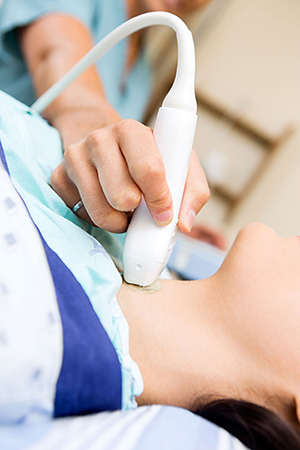
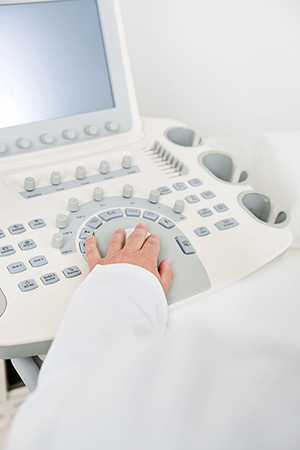
This test is done by measuring blood pressure at the ankle and in the arm while a person is at rest. Measurements are usually repeated at both sites after 5 minutes of walking on a treadmill. The ankle-brachial index (ABI) result is used to predict the severity of peripheral arterial disease ( PAD ). A slight drop in your ABI with exercise means that you probably have PAD. This drop may be important, because PAD can be linked to a higher risk of heart attack or stroke...Read More...
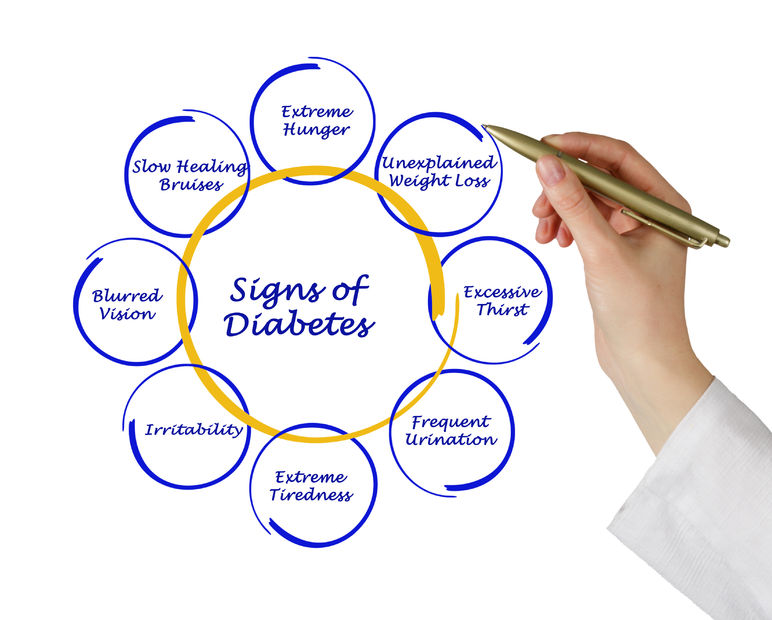
CGMS is an FDA-approved device that records blood sugar levels throughout the day and night. There are several approved devices -- Medtronic's MiniMed device, DexCom, and the Navigator, for example -- that can provide up to 288 blood sugar measurements every 24 hours. The system is used to measure an average blood sugar for up to three days, while the person with diabetes continues daily activities at home... Read More...
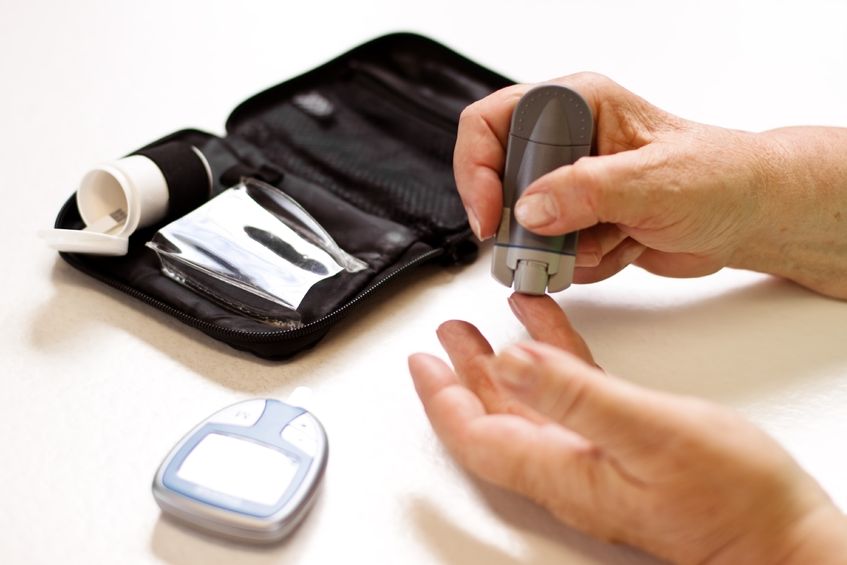
596 Anderson Ave, Suite #208
Cliffside Park, NJ 07010
Phone: (201) 941-5757
Fax: (201) 941-5779
| Monday: | 9:00am - 5:00pm |
| Tuesday: | 10:00am - 6:00pm |
| Wednesday: | 9:00am - 5:00pm |
| Thursday: | 9:00am - 5:00pm |
| Friday: | 9:00am - 5:00pm |